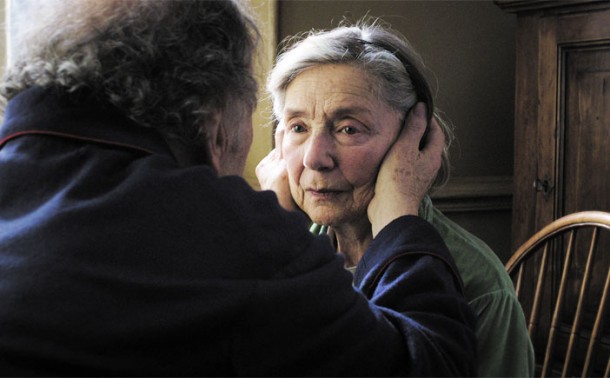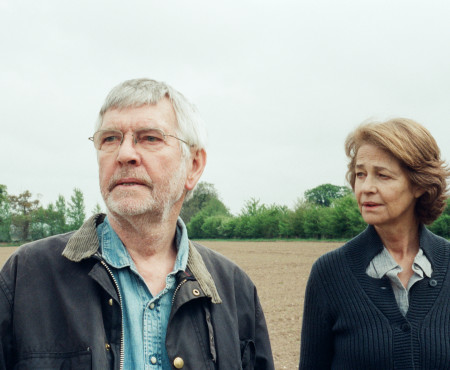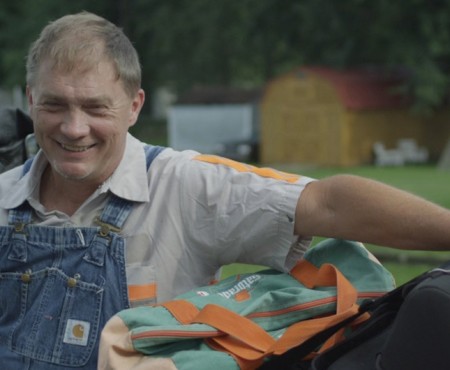A
Michael Haneke is a filmmaker who has been fascinated by suffering throughout his career. Be it the stalker notes in Cache or the punishment ritual in The White Ribbon, tension and fear of death (or worse) has always been front and center in his films. In fact, he’s so interested in it that he made a film about the sadistic torture of a suburban family by home invaders (Funny Games), and then remade his own film again! The idea of a filmmaker with that kind of reputation making a film called Amour, the French word for “love”, is a little strange, at least until we learn what the film is about, both literally and subtextually.
The film chronicles two retired Parisian music teachers, Anne (Emmanuelle Riva) and Georges (Jean-Louis Trintignant). Both of them are in their 80s, and enjoy a simple, quiet life in retirement. One morning, Anne suffers a stroke, which later paralyzes her left side. At first the two don’t make a big deal out of her condition, but her mental and physical state begin to worsen as time goes on, and Georges is faced with the hardest choices of his life.
It’s interesting that Haneke decided to simply title his film with the French word for love. It’s a literal statement on what the film is about, but it also invites further exploration on what he wants to accomplish here. On the surface, the film is about a married couple whose relationship is tested by the reality of “till death do us part”, presenting Georges with an increasingly grim situation regarding his wife’s condition. One could argue the film serves as some sort of commentary on the ongoing debate on assisted suicide and “right to die” controversies. Georges is faced with the conflict of whether to keep the love of his life alive for just a little while longer, or to let her go. As her condition worsens, it becomes increasingly apparent that she no longer has the will to live, suffering to her last breath as a shadow of her former self. Anne’s own daughter even comments to Georges that she doesn’t recognize her mother anymore. Georges retorts that Anne is his wife, and this is his decision, and no one else’s.
But really, there’s so much more going on under the surface here. As I noted before, it’s telling that Haneke would title his film the way he did. Why “Love”? Perhaps he’s trying to explore the meaning of the word, or even the indescribable emotion behind it. Love it such an individual feeling for everyone, how could one film possibly seek to define it in two hours’ time? Haneke’s trademark fascination with human suffering is present, but for the first time, it feels like he’s interested in truly understanding it beyond mere voyeuristic obsession.
This becomes increasingly clear both in Haneke’s script and his masterful direction. Instead of lingering on stylish visual touches, the film is plainly shot, taking place entirely within Georges and Anne’s apartment. We’re invited to their home in the beginning, which starts off as a warm, inviting place, but slowly becomes a prison for both characters. The increasing claustrophobia brought on by the deliberate mis-en-scène only serves to emphasize Anne’s own condition as her body betrays her over time. In an age of visually fussy films, it’s refreshing to see a master filmmaker take his time to establish an environment that at first may seem plain or dull, but serves the themes of the story in every frame, recalling the work of Bergman or Tarkovsky, and just letting the story speak for itself. For a film to attempt to define something as subjective love, much has to be left for the viewer to decide how they feel about all of it. Such is the essence of cinema, and with Amour, Haneke finds himself tapping into a language only cinema can speak.
To that end, Amour may just be Haneke’s great masterpiece, the film he’s remembered for. It is no doubt easily his most mature and dense film to date, one that will be discussed for many years to come. Whether for Emmanuelle Riva’s towering and courageous performance, the directorial mastery, or because it’s simply a story that cuts deep into both harsh and comforting realities of life, love, and death, Amour is the kind of film that endures.





















7 thoughts on “Amour: Cry Me a Riva”
Nice to see he evolved past pointing sharpened sticks at his audience.
Nice write-up, Kevin. I think your comparison to Tarkovsky is right on re: long takes. I did find, however, that this was (perhaps counter-intuitively) Haneke’s hardest film to watch. It is no so much unlike his previous work as some commentators have said. In fact, I think it’s his most unflinchingly painful. He literally makes you watch a woman die for two hours. Unlike the pointed moments of pain or violence in FUNNY GAMES or CACHE, the entire entity is the point of pain…I found it a lot to take. It just overwhelms you with the casual, subtle violence of death that comes on slowly.
Also, Emmanuelle Riva for Oscar, yes/yes? She was incredible.
I’ve found it incredibly fascinating how Amour is both Haneke’s warmest AND his most punishing film, largely because the former category ends up strengthening the latter. The White Ribbon, Cache, and Funny Games were certainly bleak as well, but they were more about an underlying dread. Amour ends up being total pain sustained for the majority of the film, and because the relationship between Trintignant and Riva feels honest and so tender.
It’s hard for me to say which of Haneke’s films is his “masterpiece”, because I loved each of the films of his that I’ve seen in their own little way, but Amour definitely had me the most emotionally devastated out of the bunch, which is a grand achievement for sure.
I just wanted to comment how brilliant the title of the review is. Well done.
Seconded. Great review Kevin; I wasn’t a huge fan of the film myself – it was a punishing experience that demonstrated just how arduous and monotonous death can be. Which is exactly what it sets out to do…just doesn’t make for a fun or exciting watch. But the performances and direction were superb.
It really isn’t, but I haven’t been able to stop thinking about it since I saw it. The pigeon, Riva, “Do you want your coat?”. Just so haunting. It’ll be with me for years.
I found the performances good, but I didn’t get much of an emotional impact out of it. Still enjoyable though.